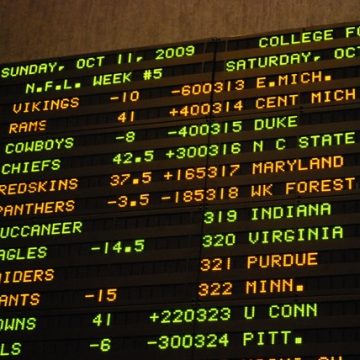
As a rule, sports betting in the States of America is a verboten activity. Other than four states that were grandfathered in by federal laws – Delaware, Montana, Nevada, and Oregon – the remainder of the country has been banned from having any type of sports betting activities. A recent study by the University of Massachusetts-Lowell finds that attitudes on sports betting are changing, with a majority now in favor of legalized sports betting across the country.
The UMass-Lowell poll was done in conjunction with the Washington Post and asked the respondents a simple question: were they in support of making gambling on professional sport legal in all 50 states. 1000 adults were contacted and the resulting interviews were conducted in both English and Spanish. Coverage went through both cellphones and landline connections and were conducted over a week’s span in mid-August.
The results were a bit surprising as 55% of the respondents answered in the affirmative that it should be legal. There was a strong opposition, however, as 33% of replies felt that the status quo should be maintained. 12% of those asked did not have an opinion on the subject. The poll had a margin of error of 3.7%.
That’s a massive change from just 25 years ago. In 1993 one of the most successful polling outlets, Gallup, teamed with CNN and USA Today to ask the very same question. In that survey, the answers were completely reversed; 56% of respondents were opposed to legalizing sports betting in the U. S.
“Most Americans now favor sports betting,” Professor Joshua Dyck, co-director of the UMass-Lowell Center for Public Opinion, noted in a statement announcing the results. “This is especially true among respondents younger than 50. This suggests that support may continue to increase in the years to come.” When it comes to what effects that could have on legislation regarding gaming across the nation, Dyck was optimistic in saying, “I would not be surprised if we see a push to legalize sports betting in more states.”
Sports betting has long been dancing with several other gaming options for state legislatures looking to close budget deficits. Along with online poker, online casino gaming and daily fantasy sports (DFS), sports betting is thought to be a potential salve for budget shortfalls in many cash-strapped states. In Pennsylvania, for example, the budget has written into its language the regulation of online casino gaming and poker, but that budget has yet to pass the Pennsylvania General Assembly.
It is sports betting, however, that seems to be the more popular alternative for regulation. In the UMass-Lowell survey, only 16% of respondents had participated in a fantasy league within the past five years. Only a quarter of those respondents played at an online DFS site, a miniscule number of people if extrapolated to the population. Online poker, for all its activism, would be even worse off unless it was a nationally allowed instead of active on a state-by-state basis.
New Jersey, who already has legalized online casino gaming and poker, is one of the most active states pursuing the legalization of sports betting, be it online or live. In 2014, the state passed a law that would allow for sports betting inside the state’s borders, but the federal government lodged complaints that have thwarted the efforts to move forward. The federal government, in this case the U. S. Department of Justice, has long contended that the Professional and Amateur Sports Protection Act of 1992 (PASPA) is the “law of the land” and prohibits individual states from enacting their own laws regarding the activity.
Appeals courts have twice ruled in favor of the feds in the case, forcing New Jersey to move to the Supreme Court for a final decision. That ‘Hail Mary’ by the New Jersey Attorneys General, first John Hoffman (2013-2015) and now Christopher Porrino, was answered in June when the SCOTUS decided to hear the case. Arguments are set to be heard this month and a decision on the case from the nine justices that make up the Supreme Court is expected in Spring 2018.
With $150 billion estimated in illegal sports betting revenue per year, the states (and, some would say, the casino industry) would love to see an expansion of gaming. There are some powerful forces arranged against New Jersey, however. All the professional sports organizations are against New Jersey’s actions, along with the NCAA and the DoJ. If the will of the people weighs into the decision from the Supreme Court, however, sports betting might be legalized, which could open the door for online casino gaming and poker across the country.















